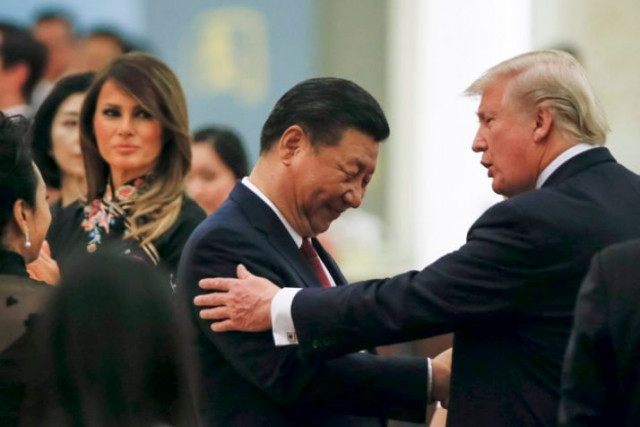US lists $50 billion in Chinese imports facing tariffs
List includes electronics, aircraft, parts, satellites, medicine, machinery and other goods

China's commerce minister warned that a trade war would harm both nations
PHOTO:AFP
The move came a day after Beijing imposed duties on about $3 billion in US exports such as pork, wine and fruit, a countermeasure to US metal tariffs that was widely seen as a warning Chinese officials will not hesitate to retaliate quickly.
The new US list, published on Tuesday includes electronics, aircraft parts, satellites, medicine, machinery and other goods, is yet to be finalised and is intended as a response to China's alleged theft of American companies' intellectual property and technology.
Retaliation: China hammers US goods with tariffs as sparks of trade war fly
"The proposed list of products is based on extensive inter-agency economic analysis and would target products that benefit from China's industrial plans while minimising the impact on the US economy," the office of US Trade Representative Robert Lighthizer said in a statement.
It identifies roughly 1,300 goods that could face duties of 25 per cent but remains subject to a review process that will last through at least May before it can take effect.
China slammed the move as "unilateralist and protectionist", and said it violated the principles of the World Trade Organization (WTO).
"It serves neither China's interest, nor US interest, even less the interest of the global economy... The Chinese side will resort to the WTO dispute settlement mechanism and take corresponding measures of equal scale and strength against US products in accordance with Chinese law."
The commerce ministry in Beijing said the countermeasures will be announced "in the coming days."
"We are confident and capable of responding to any US trade protectionist measures," the ministry said.
Over the last month, President Donald Trump has rattled markets and disregarded warnings from industry groups and members of his own Republican party in announcing punishing new tariffs on exports from major trading partners.
The move toward trade sanctions on China, however, had received mixed reviews, with some support among lawmakers and industry bodies.
The US-China Business Council said it agreed US companies suffer forced technology transfer in China - but warned against tariffs.
"The American business community wants to see solutions to these problems, not just sanctions," John Frisbie, the council's president, said in a statement.
"China needs to substantially improve market access and competitive conditions for American companies selling to and investing in China in certain sectors, but unilateral tariffs may do more harm than good and do little to address the problems in China's IP and tech transfer policies."
Monica de Bolle, senior fellow at the Peterson Institute for International Economics, said Beijing was likely to retaliate again by targeting US exports of soybeans and Boeing aircraft - two politically sensitive sectors highly dependent on the Chinese market.
"However, they can wait this out and see what comes out of the 30-day consultation period," she told AFP.
China's state-owned Global Times newspaper said Beijing had nearly completed a tariff hit list, which "will involve major Chinese imports from the US."
General trade tensions had calmed in recent days, with investors taking a degree of solace from news that Washington had begun talks to resolve differences with the European Union and China.
But in a series of irate tweets this week, Trump has renewed threats to scrap the North American Free Trade Agreement (NAFTA)- another trade bugbear the president has denounced as a killer of US jobs.
China imposes tariffs in response to US duties on steel, aluminium
Canadian, Mexican and US officials are currently in fraught negotiations to overhaul the 24-year-old agreement, but analysts say the odds are slim that a deal can be reached ahead of elections in Mexico and the United States.
In a client briefing sent before the release of the list, Mickey Levy, chief US economist for Berenberg, said Trump's trade policy was shifting from 'chaotic' to focused and might result in some successes.
"The most likely outcome of broader negotiations may even be a reduction in select trade and investment barriers that result in positives for international trade," Levy said.
But because Trump has focused on bilateral trade and specific industries, rather than overarching multi-lateral agreements, any positive outcome was "likely to be limited," he said.



















COMMENTS
Comments are moderated and generally will be posted if they are on-topic and not abusive.
For more information, please see our Comments FAQ